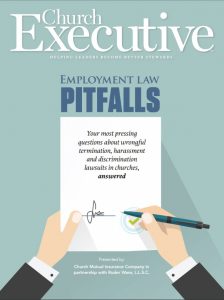
Employment Law Attorney Sara Ackermann, in partnership with Church Mutual Insurance Company, answers your most pressing questions about wrongful termination, harassment and discrimination lawsuits in churches.
In churches, a prevailing mindset regarding wrongful termination, harassment and discrimination lawsuits is, It can’t happen here. What’s the reality? Are insurers, in fact, seeing an increase in these types of claims?
Ackermann: Yes, we have seen an increase in these types of claims! We believe the reason for this is the fact that today employees have access to more information than ever before. Internet headlines, news stories and social media posts regarding employee discrimination allegations and high-dollar settlements are everywhere. With a few clicks of a keyboard, an employee can quickly find an attorney to represent them in an employment-related claim hoping to get a big payout.
In your experience, how likely is it that large churches already have policies in place to mitigate wrongful termination, harassment and discrimination risks?
Ackermann: While it is likely that a large church will have policies, we note that often these policies are not updated on a frequent basis. The law is constantly changing in this area. Policies should be reviewed every two years. In addition, we recommend employees be provided with policy training on a regular basis.
What are some real-life examples of lawsuits which churches have faced in the areas of wrongful termination, harassment and discrimination? Also, what were the outcomes of each lawsuit?

Ackermann: A Maryland jury awarded $1.35 million to a woman who claimed she was forced to quit her job as music director at a Lutheran church due to sexual harassment she suffered on the job.
A Catholic school teacher who was wrongfully terminated after she became pregnant through artificial insemination was awarded more than $200,000 in her anti-discrimination lawsuit against an Ohio archdiocese.
A Baptist church in Atlanta agreed to pay $53,000 after being sued by former employee alleging she was discriminated against because she was pregnant.
During the hiring process, are there practical steps a church can take to avoid risks related to wrongful termination, harassment and discrimination?
Ackermann: Yes. During the interview process, interviewers should be focused on the candidate’s ability to do the job. Seemingly innocent questions (e.g., Do you want to have a family?, What clubs do you belong to? Do you have health issues we need to know about?) all can be used as evidence in a claim later that the person was not hired due to unlawful reasons.
Notes taken during the interview should accurately reflect the questions asked and the answers given so there is a record if needed at a later date.
Same question, but let’s focus on the firing process.
The most critical step in the firing process is to be honest with the employee. While this is often difficult, sugar-coating the reason for termination can be used against an employer if the employee later brings a claim.
Ackermann: The most critical step in the firing process is to be honest with the employee. While this is often difficult, sugar-coating the reason for termination can be used against an employer if the employee later brings a claim.

In other words, by not giving the “real reason” for termination at the time (e.g., telling the employee his job is being eliminated instead of telling him his performance is an issue), it appears as though the employer is hiding something. The jury will not look favorably on an employer who lied and may be more easily convinced that the “real reason” was discriminatory.
It has been suggested that an objective person in the church review all termination decisions before they are carried out. Who should that individual be, and what should he or she be ‘checking’ for in each scenario?
Ackermann: Someone should review the decision to check whether the church’s articulated reason for termination is supported by objective evidence of some kind. For example, prior to terminating an employee for performance issues, the church should have something in writing warning the employee that her job is on the line.
Ideally, this person would be someone in Human Resources, but not all churches are large enough to have such a position. For small organizations, contacting outside legal counsel or a human resources consultant is recommended.
How might a church leadership team member explain to staff what a “harassing activity” entails? What does that look like, in practice? Are there harassing activities that apply, by law, across all states?
Ackermann: It is important to point out that harassment is more than just “sexual” — a harassment claim can arise out of any protected characteristic. Harassment can be explained as “unwelcome verbal or physical conduct that is based on sex, age, race, disability, etc., and interferes with an individual’s employment.”
This can be as simple as telling a sexist or racist joke.
While not all states have anti-harassment laws, federal law applies to all churches with at least 15 employees.
— Reporting by RaeAnn Slaybaugh
This Q&A is brought to you in partnership with Church Mutual Insurance Company in Merrill, Wisc. Attorney Ackermann practices with Ruder Ware, L.L.S.C., a business law firm in Wausau, Wisc.



Hello, My self Smith Patrick, I am a Law student and along with that I also write for few Law related websites. I am really impressed with the quality and the detailed information you have provide in you your article. The steps you mentioned in your article are so accurate and those who are searching for the information about “Employment law pitfalls” will get all the information they want here.